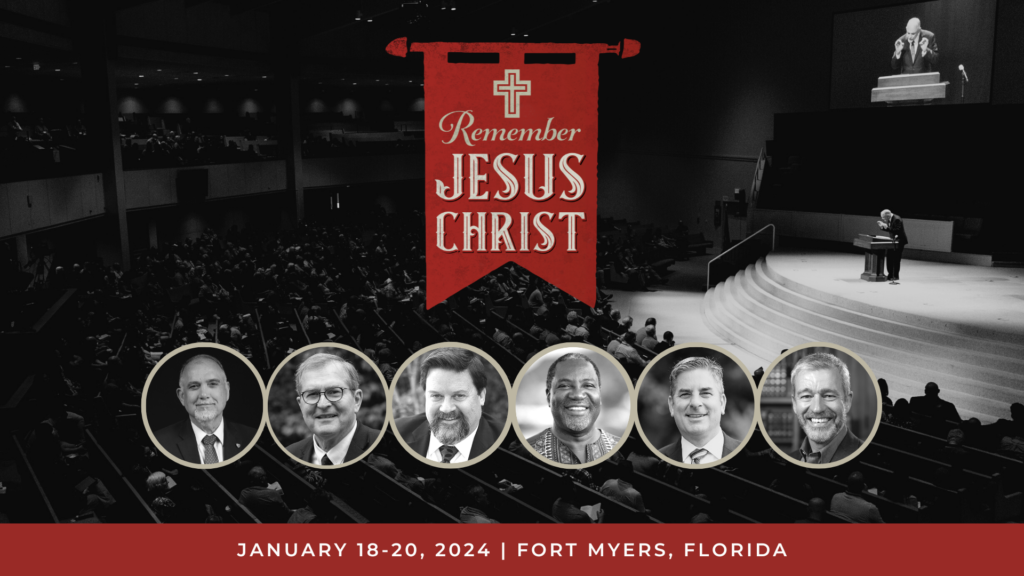This article is part 2 in a series by Tom Nettles on Remembering Jesus Christ. You can read part 1 here.
“Remember Jesus Christ, risen out of death, arising from the seed of David, according to my gospel” (2 Timothy 2:8).
In supplying the name of the one that we are to remember, he also supplies the reasons that forgetfulness in this matter is fatal. Paul supplies the name of the person who embodies the full range of truth and saving grace that counters the falsehoods, errors, and aggressive evil of fallen humanity. As he reminded the Corinthians, “As in Adam all die; even so in Christ shall all be made alive” (1 Corinthians 15:22). In the context of this letter to Timothy, Paul uses the combination “Christ Jesus” or “Jesus Christ” fourteen times. Two of these also employ the word “Lord” with the name “Jesus” and the office, “Christ.” Also, there are fifteen other uses of the word “Lord” to refer to Jesus Christ. The book is saturated with Jesus Christ, his lordship, his mercy, his purpose, his truthful word, his conquering of death, his promise of life, his salvation, his status as judge, and his personal presence with the believer. Paul aimed to make it impossible to forget either the person or the work of Jesus Christ. To forget is to deny; to deny is to give surety of an absence of grace.
Particularly Paul does not want us to forget the significance of the name and the title given to him. His name is Jesus. The angel told Joseph, calling him “son of David,” that the child with whom Mary was impregnated by the Holy Spirit was to be called “Jesus” (Matthew 1:20, 21). The significance of this designated name was related to the child’s office as Savior—“for he shall save his people from their sins.” The name means, “Jehovah is salvation.”
For Joshua (the same name), his name was a testimony to the promise of Jehovah in giving to Israel the land of Abraham. It signified that Jehovah was strong, mighty, faithful, the only God, and would accomplish all his promises, both of blessing and of cursing. He would work through Joshua to fulfill these promises and establish the context where the people would respond to this miraculous deliverance and strikingly clear revelation. Some of the promises were unconditional and unilateral. No alterations among the Israelites could change the ability and determination of God to carry through. Others were conditional and were, in one sense, dependent on the faithfulness of the people (2 Kings 23:26, 27).
The task of Joshua was typological; the task for Jesus was the substance and absolute. Joshua set the stage for the powerful display of divine purpose; Jesus embodied the mystery of godliness. Joshua testified of the power of God to save and called the people to follow him in serving the Lord (Joshua 24); Jesus did not merely testify to the power of God to save, but he possessed and executed his saving power by own righteous acts and perfect obedience. Not only like Joshua did he testify to the power of God to save, but he constituted the saving purpose of God. Though “Jesus” is his human name, it also is a testimony to his divine nature–”Jehovah is salvation.”
As “Christ,” the God-man Jesus is the anointed one. Every office and type established by anointing, the Christ culminated in himself. Did God give prophets to reveal and speak and write his word to his people? Jesus is the prophet promised through Moses, the “Word made flesh,” the Son through whom God “has spoken” (Deuteronomy 18:15, 18; John 1:14; Hebrews 1:2). Is he not the true Elisha, the God of supplication, anointed by Elijah (1 Kings 19: 16; Luke 1:17; 3:21, 22; Luke 23:34; John 1:29-34). Does the Lord not set forth the prophet as a special representative of his anointing? (1 Chronicles 16:22; Psalm 105:15). “Do not touch my anointed ones, and do my prophets no harm.” Does not Jesus claim that he is the fulfillment of the anointed prophet sent to preach good tidings to the poor, and proclaim liberty to the captives? (Isaiah 61:1; Luke 4:18).
He is Priest. As the priest was anointed to offer sacrifice (Leviticus 4:4, 5) and sprinkle the blood of the sacrifice. Christ, therefore, offered himself once-for-all putting an end to all of the typological sacrifices. Though not of the tribe of Levi, he received a special commission for this purpose (Hebrews 7:20; 8:6; 9:12, 24-26). So, Jesus Christ, having served as the anointed prophet, then completed his anointed work of priesthood, altar, and sacrifice. Nothing in the sacrificial system was left unfulfilled by him.
David was anointed king by Samuel (1 Samuel 16:13). In consequence of the Christ’s completed prophetic work and the perfection of his priesthood, he was given his seat at the right hand “of the Majesty on high” (Hebrews 1:3), fulfilling the promise to David of the forever king established by God. “And I will establish him in my house and in My kingdom forever; and his throne shall be established forever” (1 Chronicles 17:14). Jesus Christ alone, in all three of these offices can say, “I have been anointed with fresh oil” (Psalm 92:10).
Nothing else would matter if the next phrase were not vital to the way we are called upon to “Remember Jesus Christ.” Both the soteriological power and the apologetic coherence of the gospel would fall to the ground, no more to rise, without it. “Risen from the dead” denotes the conquering of the scheme of Satan to oppose the purpose of God in lifting up non-angelic creatures to a position higher than the angels—in fact, to share in some way with the glory of his Son. Jesus did not give aid to angels but was “made like his brethren,” made propitiation “for the sins of the people,” and “having purged our sins,” destroyed him that has the “power of death, that is, the devil” (Hebrews 2:14-17; 1:3). The wages of sin, the penalty of death for disobedience, unpropitiated through the ages, held as a threat by the Devil and verified by divine justice, lost its sting when Jesus “bore our sins in his own body on the tree” (1 Peter 2:24). Jesus Christ, who bore those death-dealing sins, was “raised from the dead by the glory of the Father” (Romans 6:4). This means that all the holy, righteous, and just attributes of God, the entire weightiness of God, were honored completely by Christ’s death and thus called for the granting of life to the successful sin-bearer. Death, therefore, no longer has any hold on Christ or his people and Satan’s tool of intimidation has been removed. The work of Christ and the verdict of the Father are communicated in power to the redeemed by the Spirit. “If the Spirit of Him who raised Jesus from the dead dwells in you, He who raised Christ from the dead will also give life to your mortal bodies through his Spirit who dwells in you” (Romans 8:11). God, therefore, instead of being against us is for us. Why? Because he “spared not His own Son but delivered him up for us all.” Having given us Him, he freely gives us all that Christ has gained. None can now condemn for “it is Christ who died, and furthermore is also risen, who is even at the right hand of God.” On top of that he “makes intercession for us” (Romans 8:32-34).
Under the name of Christ, we already have looked briefly at the significance of the phrase, “out of a seed of David.” The anarthrous use of spermatos has the force of isolating the word to a specific person, Mary. Jesus was born, was conceived in and then came out of Mary, a seed of David. Luke 1:27 has the phrase, “out of the house of David,” a phrase to be applied both to Mary and Joseph. The seed of the woman (Genesis 3:15) was also the seed of David. He descended from David in his human nature and has a right to the throne. “He will be great,” the angel told Mary, “and will be called the Son of the Most High, and the Lord God will give Him the throne of His father David.” (Luke 1:32). How low the House had fallen that a teenage virgin was to bear the seed of David to the Messiah and his legal father would be a mere carpenter. Luke 2:4 again emphasizes that Joseph was “of the house and lineage of David” because the enrollment must take place legally according to the male of the household. When the angel addressed Joseph to inform him of the source of Mary’s impregnation, he said “Joseph, son of David” (Matthew 1:20). Jeremiah 30:9 predicts, “They shall serve the Lord their God, and David their king.” In Ezekiel we read, “And my servant David shall be king over them” (34:24; 37:24). Hosea predicts that after a time of devastation, Israel will “seek the Lord their God and David their king” (Hosea 3:5). This descent from David confirms the prophetic material concerning the Messiah, seals the reality of his humanity, and shows that the true “Man after God’s own heart” saves us, rules over us with lovingkindness until the kingdoms of this world become the kingdom of our Lord and of His Christ.
Paul has given a thick distillation of biblical doctrine on the person of Christ in his paternal admonition to Timothy. For his preaching, his instruction of elders, and for his personal joy and assurance Paul instructed Timothy, and so instructs us, “Remember Jesus Christ, risen from the dead, of a seed of David.”
This article is part 2 in a series by Tom Nettles on Remembering Jesus Christ.
Join us at the 2024 National Founders Conference on January 18-20 as we consider what it means to “Remember Jesus Christ” under the teaching of Tom Ascol, Joel Beeke, Paul Washer, Phil Johnson, Conrad Mbewe and Travis Allen.






























